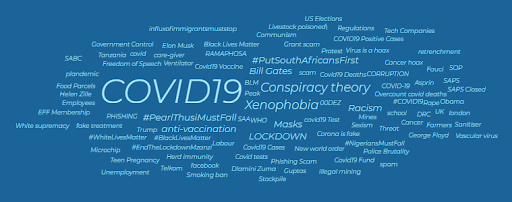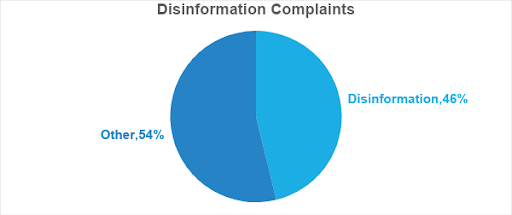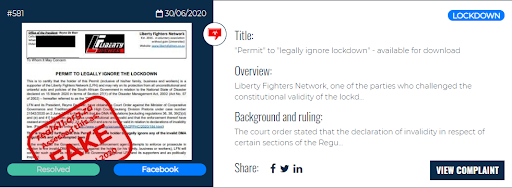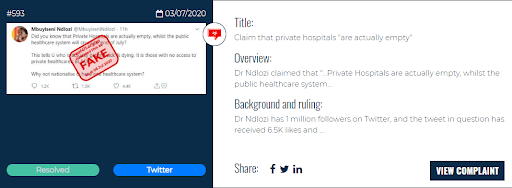OP-ED
Disinformation in a time of Covid-19: Weekly Trends in South Africa

A crisis such as the Covid-19 pandemic creates a perfect opportunity for those who wish to cause confusion, chaos, and public harm, mis and disinformation enables them to do just that…
Our sixth edition of the weekly commentary looks at how disinformation continues, unsurprisingly to focus largely on Covid-19. Over the past few weeks, we have seen a range of complaints, ranging from conspiracy theories, scams, hoaxes, confusion, deliberate encouragement of non-compliance to regulations, and simple politicking around issues related to the pandemic. This past week has been no different. The word cloud above shows us which key issues have dominated the complaints received on the platform (since about the middle of April). We see ‘Covid-19’ dominates the topics, followed by Xenophobia, Lockdown, Conspiracy Theory, Masks and Racism. This is a small window into the nature of mis and disinformation spread across our social media platforms. It also confirms how it is spread on issues that are considered hot topics currently, or issues that are already generating high levels of fear and anxiety.
Disinformation and the sharing of disinformation is one of the greatest threats to democracy and we continue to witness the dangerous dissemination and further sharing of disinformation across various social media and digital platforms.
The Real411 platform accepts complaints related to a variety of digital offences, including hate speech, incitement, harassment of journalists, and disinformation. The platform has been fully operational since 22 March, 2020, and since then, we have seen some dangerous disinformation circulating across our social media platforms. Complaints have been submitted to the platform, and action has been taken, often resulting in counternarratives being issues, or content being taken down. From the 22 March-5 July, 524 complaints have been received, 515 of which have been assessed and resolved.
The graph below depicts the number of complaints received on a weekly basis, and the number of instances of disinformation found in that same week. The data shows that although a similar number of complaints have been received, as compared to the week before, more instances of disinformation have been found. This is a particularly worrying trend. Another interesting finding is that in most cases, the higher the number of complaints, the higher the number of instances of disinformation found. This suggests that the more complaints received, the greater the levels of awareness of potential disinformation and therefore the more opportunity there is to counter the disinformation and begin taking action to clamp down on digital offences.

Looking at the week 29 June-5 July 2020 the number of complaints determined as disinformation, versus the number of complaints submitted as disinformation remains consistent, with just less than half of the submitted disinformation complaints being ruled as disinformation.

Looking at specific complaints, what have we seen in the past week? We take a look at the nature of complaints received on the platform between 29 June and 5 July 2020.

A regular reader might see that the graph below looks very similar to the one from last week. The difference here is that although we see a similar number of complaints submitted to the platform there has been an increase in the number found to be disinformation. A total of 38 complaints were received over this period, 22 of which were found to be disinformation.
Each complaint that is submitted gets assessed by three different reviewers – each an expert in their fields, including media, tech and legal. Once a complaint is assessed, it is sent to the secretariat (who is a media lawyer), and a final determination is made and further action is recommended, if necessary.
In our weekly analysis, we also take a look at where the complaints originate from, in other words, where instances of alleged disinformation have been found, and complaints submitted.

During this reporting period, it seems reported complaints have originated from a number of different platforms, as compared to other weeks reported on. We usually see most complaints coming from two or three social media platforms. This week, the data shows us that most complaints received during the period came from Twitter (16 complaints). From the complaints submitted over time, Twitter seems to be a very common platform where content has been found. Over the last week, Facebook follows Twitter, with 9 complaints. This week, complaints have also originated from WhatsApp, Instagram and YouTube.
Weekly Disinformation Trends
Continuing with the trends we have seen over the past few weeks, disinformation complaints received shows us further attempts to encourage public resistance and noncompliance with public health protocols. We have selected a few humdingers to give a sense of kinds of things being complained about.

Complaint #581 is a particularly bizarre, but not surprising complaint. This was content found on Facebook and claimed that there was a legitimate authority issuing permits authorising the holder to ignore lockdown regulations. This is in relation to one of the parties (Liberty Fighters Network) who challenged the constitutionality of the lockdown regulations. This is a classic case of disinformation where part of a truth was used to cause confusion, chaos and encourage non-compliance to government regulations.

This complaint, complaint #593 is particularly dangerous. The content originated from a Tweet posted by Dr Mbuyiseni Ndlozi claiming that “…Private Hospitals are actually empty, whilst the public healthcare system will crush be [sic] end of July…”. He went on to suggest nationalisation of the healthcare system. This particular tweet is problematic because although the nationalisation of healthcare may be considered an opinion, the factual inaccuracies concerning the management of Covid-19 is dangerous. This Tweet seems to have been posted as an opportunity to further a political agenda.

It would not be a week of disinformation trends if we did not receive conspiracy theory content, such as Complaint #598. Yet again, we see a Facebook page being reported, containing a range of mis and disinformation related to anti-mask and anti-vaccine sentiments, as well as other conspiracy theories. As one of our reviewers noted, “there is no evidence suggesting that the Facebook page accountholder is deliberately misleading her followers. Rather, it would seem that she holds a strong conviction that the information she is sharing, is true.” Merely because a person believes something doesn’t mean it is no longer potentially harmful to the public. Some might believe for example that drinking sanitiser may kill Covid-19 from within, it may be a genuinely held belief, tangentially encouraged by a certain President, but it doesn’t mean it isn’t harmful and spreading such content is thus misinformation.

#600 is an interesting complaint as it shows how text that accompanies an image may shift it from being harmless or even funny to being misinformation. In the content we see some anti-mask images. On their own they might be seen as satire or making fun of those who feel mask wearing is a sign of oppression, but in the complaint they were used in a response to a post by the Minister of Health who had spoken about the importance of wearing masks, the user then replied, “sheeps will accept that shit”. In so doing, it shifted the understanding of the images away from satire to being messages that supported the notion that those who wore masks were mindless sheep.

#603 is interesting because it takes a clip from a World Health Organisation official and uses it to support an unfounded argument that the WHO has done a U-turn on how Covid-19 spreads and the need for quarantine. Unless the user knew that the WHO was actually speaking about asymptomatic people with Covid-19, they may have believed this. The concern is that the clip was selectively used to seek to undermine information about Covid-19 and undermine the accuracy and validity of the information presented by WHO. Accordingly, the complaint was ruled as disinformation. This is not to suggest that people should just accept everything from a figure of authority but it is one thing to question and interrogate, and quite another to selectively quote to support another agenda.
The continued resistance to wearing masks is really extraordinary and to a rational person may seem utterly bizarre. What would make people seem anxious not only to refuse to wear them but to also seek to construct the wearing of masks as a means of unconstitutional control? This despite them not preventing the wearer from expressing views or opinions, impeding movement or association. Perhaps the only group of people who have more than legitimate concerns with them may be people who are hard of hearing and who rely on lip-reading to assist their communication. The question around opposition to mask wearing is linked to one we are commonly asked. Why do people spread mis and disinformation to begin with?
There are generally three main reasons people spread mis and disinformation. Politics and power is one reason. Here, think of those who seek to spread misinformation to push a political agenda, or drive a particular political ideology. It might be part of a well orchestrated strategy, like the well funded Bell Pottinger scheme, or it might just be made up to suit short-term political goals, like the complaint highlighted above. The public can be forgiven for thinking the old joke, “how do you know when a politician is lying? When their lips are moving”, is true. Sure, it isn’t true of all of them but when leaders like Trump and Johnson do it routinely and simply move on in the hope we will all forget, it undermines faith in all politicians. In any event this kind of motivation for spreading mis and disinformation is probably one of the oldest, since Julius Caesar was told, no don’t worry Julius, go and stand on the steps of the Senate, we have your back. The only difference really is that now it can be spread with vicious force, speed and ubiquity, thanks to social media.
The second reason people spread mis and disinformation is money. As we have seen already on Real411, there are a number of people who have been spreading misinformation to sell magic products that don’t work pretending to be government schemes ready to hand out money. There is a special place in hell for the people who create this stuff as they deliberately trade on fear, anxiety and need to make themselves rich.
This week, DFR Lab’s Jean LeRoux revealed how one person actually took scumbaggery to a new level where a person used race baiting to drive traffic to his websites and thus generate ad revenue. The third most common reason is the bully sadist trolls – those who may have taken to smoking their socks instead of cigarettes, or also those who just get their kicks from scaring, angering or getting a reaction from people. Sometimes harmless, more often than not cruel or just out of touch with reality, these people may invent stuff about masks making you suffocate, or suggest that Covid-19 is all made up to control us all and let the lizard people in power finally take command.
Whatever the reasons, the key element to remember as we have to deal with the epidemic reaching a peak in our country, is that in the face of pain and anger and anxiety, what we need is more calm, informed information. We need more news media to help us understand the complexity of what’s going on and to keep reminding us of other big issues as well.
One of the most horrific stories of the period, of Bulelani Qolani being dragged from his shack naked, ironically served to highlight the importance of treating all with compassion. The outpouring of anger and rage at such an awful violation of a person’s dignity and rights demonstrates that for all the brutality and cruelty there are millions who are genuinely outraged at such abominable treatment. So again, if you receive content on your device that angers, plays on your fears, shouts stereotypes or hatred, stop. Check to see if the content has any validity on credible sites, if it is not there, you can report it to Real411. Positive action is almost always better than negative reaction. DM
















